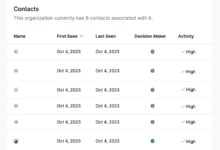Phone Based CRM: 7 Powerful Benefits You Can’t Ignore
Imagine managing your entire customer relationship from the device you already carry everywhere—your phone. With a phone based CRM, that’s not just possible, it’s revolutionizing how businesses connect, convert, and retain clients.
What Is a Phone Based CRM?

A phone based CRM (Customer Relationship Management) system is a mobile-first platform designed to manage customer interactions, track sales, and streamline communication—all from a smartphone. Unlike traditional CRM software that relies on desktop access, phone based CRM brings the power of customer management directly into the hands of sales teams, field agents, and service reps on the go.
Core Definition and Functionality
At its heart, a phone based CRM integrates contact management, call tracking, task scheduling, and data logging into a mobile application. These tools allow users to update customer records in real time, log calls and messages, and access vital sales pipelines from anywhere with an internet connection.
- Real-time customer data access
- Automated call and SMS logging
- Integration with calendars and email
This functionality ensures that no interaction goes unrecorded, reducing data gaps and improving team accountability. According to Salesforce, companies using CRM systems see a 36% increase in customer satisfaction—mobile access amplifies this by enabling faster responses.
Evolution from Desktop to Mobile CRM
CRM systems began as desktop-bound databases in the 1990s, primarily used for storing customer information. Over time, they evolved into comprehensive platforms with sales forecasting, marketing automation, and analytics. However, these systems often required users to return to the office to update records.
The rise of smartphones and cloud computing changed everything. Mobile CRM emerged, and phone based CRM took it a step further by optimizing the entire interface for touch, voice, and on-the-go use. Today, platforms like Zoho CRM and HubSpot CRM offer full-featured mobile apps that rival their desktop counterparts.
“The future of CRM isn’t on a desk—it’s in your pocket.” – TechCrunch, 2023
Top 7 Benefits of Using a Phone Based CRM
Adopting a phone based CRM isn’t just about convenience—it’s a strategic move that enhances productivity, improves customer engagement, and drives revenue. Let’s explore the seven most powerful advantages.
1. Real-Time Access to Customer Data
With a phone based CRM, sales reps can pull up customer histories, past interactions, and purchase behavior instantly during a call or face-to-face meeting. This immediate access allows for personalized conversations and informed decision-making.
- View customer notes and preferences before dialing
- Check order history during a support call
- Update records immediately after a conversation
This eliminates the lag between interaction and data entry, reducing errors and ensuring that every team member has the latest information. A study by Nucleus Research found that real-time data access can boost sales productivity by up to 26%.
2. Increased Sales Team Mobility
Sales professionals are rarely at their desks. A phone based CRM empowers them to work from client sites, trade shows, or while traveling. Whether you’re in a taxi or waiting for a flight, you can follow up on leads, schedule meetings, and close deals.
Platforms like Pipedrive offer mobile-first interfaces that make navigating deals intuitive, even on a small screen. This mobility translates into faster response times and higher conversion rates.
3. Enhanced Customer Engagement
When your CRM is always with you, you can respond to customer inquiries within minutes, not hours. Quick replies build trust and show that your business values their time. A phone based CRM often includes built-in calling, SMS, and email features, allowing seamless communication without switching apps.
- Send personalized follow-ups right after a call
- Automate birthday or anniversary messages
- Track customer sentiment from call logs
According to HubSpot, 90% of customers rate an “immediate” response as important or very important when they have a question. A phone based CRM makes this level of service achievable.
How Phone Based CRM Improves Sales Efficiency
Sales efficiency isn’t just about making more calls—it’s about making the right calls at the right time. A phone based CRM streamlines workflows, reduces administrative overhead, and keeps reps focused on selling.
Automated Data Entry and Logging
One of the biggest time-wasters for sales teams is manual data entry. Traditional CRMs require reps to remember every call and log it later, often leading to incomplete or inaccurate records.
Phone based CRM systems use call tracking and voice-to-text technology to automatically log interactions. For example, when you make a call through the app, it’s instantly recorded in the customer’s profile, along with duration and transcript (if enabled). This automation saves hours per week and ensures data integrity.
Task and Follow-Up Reminders
Missed follow-ups are a major cause of lost deals. A phone based CRM integrates with your calendar and sends push notifications for upcoming tasks, meetings, or overdue calls.
- Set reminders for proposal follow-ups
- Automatically schedule the next touchpoint after a call
- Receive alerts for high-priority leads
These features keep your pipeline moving and reduce the risk of dropping the ball. Research by Forbes shows that 80% of sales require five follow-ups, yet 44% of reps give up after the first attempt. A phone based CRM helps you stay persistent.
Key Features to Look for in a Phone Based CRM
Not all mobile CRM apps are created equal. To get the most value, look for platforms that offer these essential features tailored for phone use.
Call and SMS Integration
The cornerstone of any phone based CRM is native calling and messaging. Instead of switching between your phone app and CRM, integrated calling lets you dial directly from a contact’s profile. The system logs the call automatically and can even record it (where legal).
SMS integration allows you to send bulk messages or personalized texts with tracking. You’ll know when a message is delivered and read, enabling better timing for follow-ups.
Offline Mode and Syncing
Field workers often operate in areas with poor connectivity. A good phone based CRM offers offline mode, allowing you to view contacts, add notes, and log calls even without internet. Once connectivity is restored, the app syncs all changes to the cloud.
This ensures uninterrupted productivity and prevents data loss. Platforms like Zoho CRM and Salesforce Mobile have robust offline capabilities that make them ideal for remote teams.
Customizable Dashboards and Reports
Managers need visibility into team performance. A phone based CRM should offer mobile-friendly dashboards that display key metrics like calls made, deals closed, and lead conversion rates.
- View real-time sales pipelines
- Track individual and team KPIs
- Generate reports on the go
These insights help managers make quick decisions and provide timely coaching. Customization ensures that each user sees the data most relevant to their role.
Top Phone Based CRM Platforms in 2024
With so many options available, choosing the right phone based CRM can be overwhelming. Here are five of the most powerful and user-friendly platforms dominating the market in 2024.
1. HubSpot CRM
HubSpot CRM is a favorite among small to mid-sized businesses for its intuitive interface and powerful free tier. Its mobile app offers full functionality, including contact management, deal tracking, and email logging.
- Free forever plan with mobile access
- Seamless integration with Gmail and Outlook
- Automated activity logging from calls and emails
The app also supports voice calls and meeting scheduling, making it a true phone based CRM. Learn more at HubSpot’s official site.
2. Zoho CRM
Zoho CRM stands out for its AI-powered assistant, Zia, and deep customization options. The mobile app is highly optimized for smartphones, offering voice commands, offline access, and field service management.
- Voice-enabled data entry
- AI-driven sales predictions
- Integration with Zoho’s entire suite of business apps
It’s ideal for teams that need advanced automation and scalability. Visit Zoho CRM to explore its mobile features.
3. Salesforce Mobile
Salesforce remains the gold standard for enterprise CRM. Its mobile app brings the full power of Salesforce to your phone, including Lightning Experience, Einstein AI, and custom workflows.
- Real-time collaboration with team members
- Advanced reporting and analytics
- Customizable mobile layouts
While it has a steeper learning curve, Salesforce Mobile is unmatched in functionality for large organizations. Check it out at Salesforce Mobile.
How to Implement a Phone Based CRM in Your Business
Adopting a phone based CRM requires more than just downloading an app. A successful rollout involves planning, training, and ongoing support.
Assess Your Team’s Needs
Before choosing a platform, evaluate your sales process, team size, and customer interaction patterns. Ask: Do your reps make dozens of calls daily? Do they need offline access? Are they tech-savvy or do they need a simple interface?
Conduct surveys or interviews with your team to identify pain points. This ensures the chosen phone based CRM aligns with real-world usage, not just theoretical benefits.
Choose the Right Platform
Compare top contenders based on features, pricing, ease of use, and integration with existing tools (e.g., email, calendar, ERP). Look for free trials or demos to test the mobile experience firsthand.
- Test call logging and SMS features
- Check offline functionality
- Evaluate customer support responsiveness
Involve key stakeholders in the decision to ensure buy-in and smoother adoption.
Train Your Team Effectively
Even the best phone based CRM will fail if users don’t know how to use it. Provide hands-on training sessions, video tutorials, and quick-reference guides.
Focus on high-impact features like making calls from the app, logging notes, and setting follow-up tasks. Assign internal champions to help others and gather feedback during the first few weeks.
“Training isn’t a one-time event—it’s part of the adoption culture.” – Gartner
Common Challenges and How to Overcome Them
While phone based CRM offers immense benefits, it’s not without challenges. Here’s how to tackle the most common issues.
Data Security and Privacy Concerns
Storing customer data on mobile devices raises valid security concerns. Lost phones or unsecured apps can lead to data breaches.
Mitigate risks by: enabling two-factor authentication, using encrypted CRM platforms, and implementing remote wipe policies. Choose vendors that comply with GDPR, CCPA, and other privacy regulations.
User Adoption Resistance
Some team members may resist switching from familiar tools or fear being monitored. Address this by emphasizing how the phone based CRM reduces their workload, not increases it.
- Highlight time-saving automation
- Show real-life success stories
- Offer incentives for early adopters
Transparency and ongoing support are key to overcoming resistance.
Integration with Existing Systems
A phone based CRM should work seamlessly with your email, calendar, and marketing tools. Poor integration leads to data silos and frustration.
Choose platforms with robust APIs and pre-built connectors. Test integrations thoroughly before full deployment. Platforms like HubSpot and Zoho offer hundreds of integrations via Zapier or native connections.
Future Trends in Phone Based CRM Technology
The evolution of phone based CRM is far from over. Emerging technologies are shaping the next generation of mobile customer management.
AI and Predictive Analytics
AI is transforming phone based CRM by predicting customer behavior, suggesting next-best actions, and automating routine tasks. For example, AI can analyze call transcripts to detect customer sentiment and flag at-risk accounts.
Platforms like Salesforce Einstein and Zia are already using machine learning to enhance decision-making. In the near future, your phone based CRM might proactively remind you to call a customer before they churn.
Voice-Activated CRM Commands
As voice assistants like Siri, Google Assistant, and Alexa improve, CRM vendors are integrating voice commands. Imagine saying, “Log a call with John about the proposal,” and your phone based CRM does it automatically.
This hands-free operation is especially valuable for field sales and service technicians. Expect more natural language processing (NLP) features in upcoming CRM updates.
Augmented Reality (AR) for Field Sales
AR is beginning to merge with CRM. Sales reps can use AR-enabled smartphones to overlay product specs, pricing, or customer history during in-person meetings. For example, pointing your phone at a client’s facility could pull up their service history and contract details.
While still in early stages, AR-enhanced phone based CRM could revolutionize complex sales environments like industrial equipment or real estate.
What is a phone based CRM?
A phone based CRM is a mobile-optimized customer relationship management system that allows users to manage contacts, track sales, log calls, and communicate with customers directly from a smartphone.
Can a phone based CRM work offline?
Yes, many phone based CRM platforms like Zoho CRM and Salesforce Mobile offer offline mode, allowing users to access data and log activities without internet, with automatic syncing once connectivity is restored.
Is my customer data safe on a phone based CRM?
Reputable phone based CRM providers use encryption, secure authentication, and compliance with data protection laws (like GDPR) to safeguard your information. Always enable security features like PIN locks and remote wipe.
Which phone based CRM is best for small businesses?
HubSpot CRM and Zoho CRM are excellent choices for small businesses due to their user-friendly interfaces, free plans, and robust mobile features.
How does a phone based CRM improve sales productivity?
By providing real-time data access, automating logging, enabling instant follow-ups, and offering task reminders, a phone based CRM reduces administrative work and helps sales teams focus on closing deals.
Adopting a phone based CRM is no longer a luxury—it’s a necessity for businesses that want to stay competitive in a mobile-first world. From real-time customer insights to AI-powered automation, these tools empower sales teams to work smarter, respond faster, and build stronger relationships. Whether you’re a solo entrepreneur or managing a large sales force, the right phone based CRM can transform how you engage with customers. The key is to choose a platform that fits your needs, train your team effectively, and embrace the mobility revolution. The future of customer relationship management is in your hands—literally.
Further Reading:



